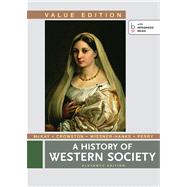The lively and accessible narrative and the hallmark focus on social and cultural history that has made A History of Western Society one of the most successful textbooks for the Western civilization course is now available at a greatly reduced cost. The new Value Edition of A History of Western Society includes the full narrative, the popular "Individuals in Society" feature, and select primary sources, images, and maps. Available with all of the integrated media and supplements of the full text--including access to LearningCurve, Bedford's new online adaptive learning resource, and new online document assignments—the Value Edition offers a wealth of resources for students and more flexibility for instructors, all at an extremely affordable price.
To see an example of the new Online Document Assignment from Chapter 14, click here.








